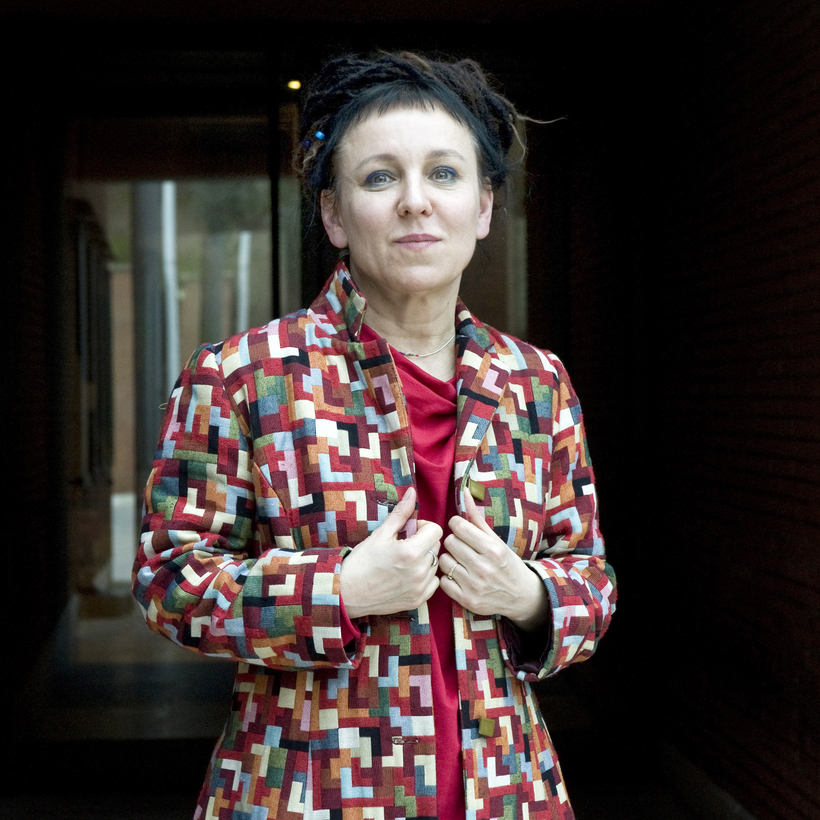At the opening of Olga Tokarczuk’s fascinating if ultimately frustrating novel, the narrative voice might be that of the nameless old woman at the heart—and “heart” is the word—of Samuel Beckett’s exquisite and deeply moving late work, Ill Seen Ill Said (1981); that in its closing pages Drive Your Plow over the Bones of the Dead (translated by Antonia Lloyd-Jones) reads more like one of the Série Noire thrillers Beckett liked to relax with is not disastrous, but could well have been, in the hands of a lesser artist. Why Tokarczuk should have chosen to round off a narrative suffused with tragic mystery with a clumping “twist in the tail” dénouement that would embarrass Hercule Poirot is itself a mystery.
Tokarczuk is one of Poland’s most celebrated writers, whose novel Flights won the 2018 International Booker Prize. She is also something of a political and social activist, which is usually a worrying thing to hear of an artist—there are always fatalities at the bloody crossroads where politics and literature meet.
The abiding, one might even say the obsessive, theme of Drive Your Plow Over the Bones of the Dead—first published in Poland in 2009—is humankind’s cruel, stupid, and disgraceful treatment of its fellow animals. The reader should not be put off by this. The book for most of its length is a lively tragicomedy splendidly sustained, and although there is a polemic at its heart, it manages to skirt ideology, or at least to mask it.
The narrator, Janina Duszejko, lives alone in a tiny hamlet on an isolated plateau in southern Poland, where the climate is relentlessly harsh. The weather lours over this book like a permanently inauspicious alignment of the planets. And Janina—she hates her name; but then she hates all names, on principle—is a dedicated astrologer. For her, our lives are controlled in their every aspect by the dispositions of the heavenly bodies. That no one else takes her stargazing seriously does not trouble her; she knows what she knows. Echoing Beckett’s solitary old woman, she aligns herself with love’s brightest star: “At night I observe Venus, closely following the transitions of this beautiful Damsel.”
Yet the momentous implications of astrological pre-determination for us poor humans are readily acknowledged: “This connection with something as great and monumental as the sky makes us feel uncomfortable. We’d rather be small, and then our petty little sins would be forgivable.”
“This connection with something as great and monumental as the sky makes us feel uncomfortable. We’d rather be small, and then our petty little sins would be forgivable,” writes Tokarczuk.
It is not clear what age Janina is, though more than once she refers to herself as old. The years have not blunted her moral acuity, however, and her tirades against humankind’s murderousness are worthy of Swift at his most righteously indignant. In her earthbound life Janina is, or was, somewhat improbably, an engineer, who built, or says she built, bridges not only in Poland but also in the Middle East. However, the onset of her “Ailments,” the exact nature of which we are not told—although one of them is an irresistible propensity to weep—forced her to change her life and become a teacher. She also caretakes, for payment, a number of holiday homes in the area.
Janina has her friends, all designated by nicknames. Chief among them are, first, her neighbor, Oddball, a gruff but kindly fellow who looks out for her welfare; the gentle girl known as Good News, administrator of the local charity shop; and Dizzy, a young man with whom Janina is collaborating on a translation into Polish of the poems of William Blake.
Blake is an abiding presence in the novel—its lodestar, we might say. The book’s title is adapted from his 1793 book, The Marriage of Heaven and Hell, and each chapter carries an epigraph from the poet’s verse and letters. The narrative throbs with a Blakean intensity, and there are Blakean cadences throughout, complete with arbitrary capital letters: “We have a view of the world, but Animals have a sense of the world”; “Sparks come from the very source of light and are made of the purest brightness … ”; “I could live in everlasting Dusk.”
William Blake is an abiding presence in the novel—its lodestar, we might say.
The novel is cast in the form of a murder mystery, but not of the standard formula, at least not until we arrive at that formulaic ending. For the rest, think of Dürrenmatt, or Robbe-Grillet, or Georges Simenon, in his roman dur mode. Corpses turn up, the result of brutal slayings. The first is that of Janina’s neighbor, Big Foot, who has choked to death on the bone of a deer he had hunted and shot. Then the commandant of the police, another enthusiastic hunter, is found dumped headfirst in a well. Later a local bigwig gets his foot caught in one of his own animal snares, which first hoists him skyward by the ankle and then drops him into a pit he himself had dug.
These deaths are not afforded the significance they would carry in a traditional murder yarn. Janina is too much concerned with the timeless cosmic patterns guiding our fate to bother herself with this or that particular, temporal demise.
Drive Your Plow Over the Bones of the Dead is a strange and strangely persuasive work. Despite the references to Beckett above, Tokarczuk’s voice is wholly her own, as is her take on the world and its unaccountable, savage, and, in some rare cases, saintly human inhabitants. And the book is beautifully written—and beautifully translated. Pages of down-to-earth wisdom are punctuated with passages of quirky lyricism:
“Reality has grown old and gone senile; after all, it is definitely subject to the same laws as every living organism—it ages. Just like the cells of the body, its tiniest components, the senses, succumb to apoptosis. Apoptosis is natural death, brought about by the tiredness and exhaustion of matter. In Greek this word means ‘the dropping of petals.’ The world has dropped its petals.”
Randall Jarrell famously defined the novel as an extended work of prose which has something wrong with it. Certainly Drive Your Plow Over the Bones of the Dead is marred at the end, but its main parts are skillfully crafted and subtly affecting. Olga Tokarczuk is a significant voice in these troubled times.
John Banville is the author of several novels, including The Sea, for which he won the Man Booker Prize in 2005, and, most recently, Time Pieces: A Dublin Memoir, out now. He is also a screenwriter


